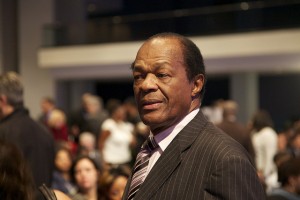Why so many black residents left D.C. and Marion Barry on diversity
D.C. Councilman Marion Barry (Ward 8 ) spoke with Michel Martin on NPR’s Tell Me More program today about D.C.’s dropping black population. Martin tried to get Barry to explain his call to stop gentrification as quoted in a Washington Post article from last week.

Flickr: Tom Bridge
The exchange itself is worth a listen, but here are some choice moments:
“What gentrification does is that it displaces longtime residents, longtime people who have been here 10, 20, 25 years and have been renters,” Barry said.
Barry also mentioned that “the Hispanic population grew by 9 percent and we welcome that kind of growth, but this city and other cities have to deal with gentrification.” He goes on to say that “white people… are displacing African American renters, gentrifying the city. I’m not afraid to speak up and say that’s something we have got to deal with.”
Later, Martin tells Barry “what’s interesting about your perspective here is that you were elected initially as part of a multicultural campaign. With your initial campaign you had strong support from a number of multiracial communities, including the gay community which often has been on the leading edge of revitalizing neighborhoods that have previously been in disrepair. So for some people, it’s why all of a sudden now you’re critical of the very people who supported you initially.”
Barry: “Well, I’m critical about the process… We have to stop it.”
Martin: “Yes, but why do we have to stop it?”
Barry: “Because it displaces long-term residents and therefore it changes things.”
We’re not sure if that does much to satisfy your desire for further clarification or not, but Martin raised a point — “why do we have to stop it?” — that is similar to the questions raised by Ta-Nehisi Coates last week: “In all these stories about Washington’s shifting dynamics, I’ve yet to see anyone, in any rigorous way, demonstrate why this shift is–in and of itself–bad for African-Americans,” Coates writes. “There’s this implicit assumption that most black people who departed the District would have stayed if not for the hipster influx. But how do we know this? How do we know they aren’t, say, fleeing the District’s much maligned school system?”
Yesterday we spoke with demographer Roderick J. Harrison, a senior fellow at the Joint Center and a Howard University associate professor, to get a better understanding of the city’s shifting demographics. He framed D.C.’s loss of 39,000 black residents in this light: gentrification wasn’t the major driving force in Wards 7 and 8, where population losses were the greatest. Rather, it was by-and-large classic suburbanization in which people left the city’s poorest wards “that are often considered the worst neighborhoods,” Harrison said.
“The force behind it probably is seen as a positive force. These are people who are some way or another, they are upwardly mobile, they are improving their housing and neighborhood conditions, they are making personal decisions that they see, on the whole, as an improvement,” he said.
Harrison, who used to work for the Census Bureau, said that the 2000 data showed that most of the black people who left Wards 7 and 8 then left for Prince George’s County, Md., which Barry called “Ward 9″ in the Washington Post story.
But Harrison continued: “You always have the problem that those who are more able to move do so, and it’s often leaving behind a population that has fewer resources, lower income, higher poverty.”
Of course, the story is different in more rapidly-gentrifying neighborhoods where many whites have settled, but Harrison pointed out that longtime homeowners tend to win out in those scenarios because their home equity improves. Longtime renters, though, are being priced out, and it’s those individuals that is seems Barry is speaking about.
Now D.C.’s black residents can voluntarily move to the suburbs for better housing, economic and educational opportunities, whereas before fair housing laws, many African Americans didn’t have much of a choice over which neighborhoods they could live in, regardless of class. The fact that so many have been able to leave speaks to a freedom to move, one that didn’t always exist for African Americans. But how much freedom is there really when the conditions in your neighborhood are so bad that you have to move from your city entirely in order to have a better life?









